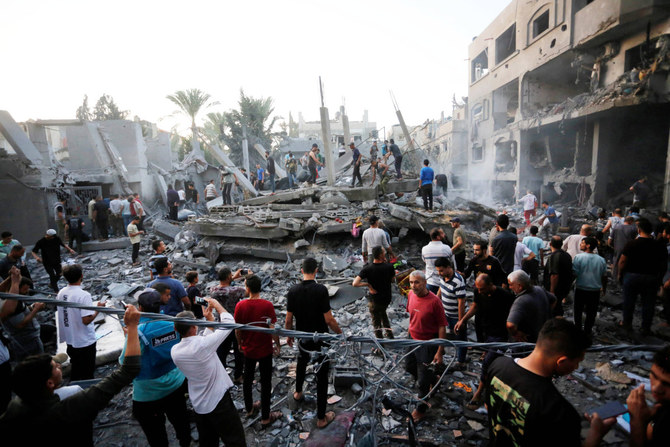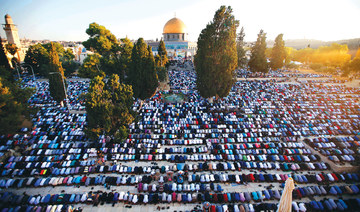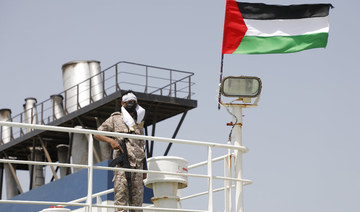CHICAGO: A former White House envoy to the Middle East has blamed Iran for the upsurge of violence in the region, while warning that there can be no peace until Hamas is “uprooted.”
Jason Greenblatt, who served under Donald Trump as the inaugural Special Representative for International Negotiations between January 2017 and October 2019, was unambiguous in laying the blame for the worst outbreak of violence between Israel and neighboring Gaza in more than a decade.
“In my view, the Iranian regime is behind all of this,” Greenblatt told The Ray Hanania Radio Show, sponsored by Arab News and broadcast weekly on the US Arab Radio network.
“They’re not just behind Hamas. They’re behind Hezbollah, they’re behind the Houthis and, of course, you have Daesh. All of these terror groups are enemies, not just of Israel but of America, of our friends and allies throughout the Middle East, our Gulf friends and allies, Jordan, Egypt.
“So, I would first and foremost put the blame on the Iranian regime and its terror proxies, Hamas and Palestinian Islamic Jihad.”

Jason Greenblatt, for US envoy to the Middle East. (AN photo)
Greenblatt, author of the book “In the Path of Abraham: How Donald Trump Made Peace in the Middle East,” pointed to developments that appeared to be bringing Israel closer to an agreement with Saudi Arabia, following on from the Abraham Accords that normalized its relations in 2020 with the UAE and Bahrain, as a trigger for Iran’s animosity.
“I think the potential Saudi peace deal with Israel, which we all know is extraordinarily complicated, leaves the Iranian regime angry and scared,” Greenblatt said.
“We weren’t on the cusp of it yet, but it was certainly headed in the right direction, and this probably prompted them to use this moment in time to launch their brutal, savage attack.”
As of Wednesday, the Oct. 7 attacks across Israel’s southern district had left 1,400 dead and 3,400 wounded, while Hamas managed to kidnap at least another 199 people. Greenblatt said it appeared the Hamas assault, the deadliest since 1973, had been in the planning for as long as least two years.

Bodies of people killed in the attack by Gaza-based Hamas militants on southern Israel await identification outside the National Center for Forensic Medicine in Tel Aviv on October 16, 2023. (AFP)
“I suspect, and I don’t know this for sure, but I suspect that Hamas saw the protests in Israel and what they thought was a divided society,” he said.
“They saw reservists saying they won’t answer the call of duty. But, clearly, they misread this because, as I understand it, the draft has hit 130 percent, not just 100 percent, with Israelis having come from all corners of the world to stand alongside the Israelis there, to defend their homeland, to defend their country.”
When pushed on the notion of de-escalation and a route to peace, Greenblatt — who was speaking on Tuesday before the destruction of a Gaza hospital, the perpetrators of which remain unconfirmed — said that as long as Hamas existed “there’s not really much to discuss.”
He said that Israel and the Palestinian people need the same thing, namely “proper leadership” seeking a better future rather than the destruction of Israel.

US President Joe Biden is greeted by Israeli Prime Minister Benjamin Netanyahu after arriving at Ben Gurion International Airport in Tel Aviv on Oct. 18, 2023. (AP)
“As difficult as the lives of the Palestinians have been, the 2 million-plus Palestinians in Gaza, their lives are miserable because of Hamas,” he said.
“Could things be different if Israel didn’t have to blockade (Gaza), or Egypt didn’t have to blockade (Gaza) again? We could talk about all that — there’s so many nuances there. But the primary source of the misery of Palestinians, and the attacks on Israel, is Hamas. And just in terms of this recent flare-up, this violence that we saw was what provoked it.”
But Greenblatt was unequivocal in his rejection of any blame on Israel’s part for the situation, similarly disputing US responsibility as he commended the Biden administration’s “very strong” response and unwavering support for its ally.
His comments stood in marked contrast to those of the other guest on The Ray Hanania Radio Show, Mustafa Barghouti, general secretary of the Palestinian National Initiative, and a member of the PLO and Palestinian Legislative Council.

Mustafa Barghouti, general secretary of the Palestinian National Initiative. (AN photo)
“I think the biggest side to blame is, of course, Israel, which, for 56 years, has continued the illegal occupation of the West Bank, Gaza Strip and East Jerusalem; ethnically cleansed 70 percent of the Palestinian population, a process which began in 1948 by preventing refugees from returning home; and has obstructed every possible way of having a peaceful resolution,” Barghouti said.
“But, in particular, one should blame (Benjamin) Netanyahu, who advocated in every possible way the cancelation of any peace process. He wrote a whole book in 1994 against the Oslo agreement and against the possibility of a two-state solution, and he even (incited) the Israeli public against the prime minister of Israel who signed the peace accords.”
Greenblatt was lukewarm about the potential for a two-state solution, expressing his dislike of the phrase, which he sees as a “couple of short words,” and noting instead the plan he worked on under President Donald Trump for the creation of a “successful (Palestinian) society.”
There was further disagreement in the position of the two speakers, as Barghouti criticized the behavior of the US, not only in the aftermath of the Oct. 7 assault by Hamas but also in the years preceding it.
“The third party to blame is the US, in particular President Joe Biden and his secretary of state, Antony Blinken. (I say this) because Palestinians tried to warn them several times about the explosive situation, about the fact that the Israelis had eliminated the idea of peace based on two-state solution through settlement building,” he said.
Barghouti accused the US of engaging in “double standards” by spending “billions of dollars” to help Ukraine fight against occupation, while at the same time offering similar support to Palestine’s occupying force, adding that Washington’s position has emboldened Israel’s more extreme political factions.
To back up his claim, Barghouti noted that the population of Jewish settler numbers has risen from 120,000 at the time of the Oslo Accords in 1993 to 750,000 today, one of whom is Israel’s Finance Minister Bezalel Smotrich.

Israeli soldiers deploy following clashes between Palestinians (not pictured) and Israeli settlers who set up tents on their lands in Halhoul village north of Hebron in the occupied West Bank on August 1, 2023. (AFP)
“Today, 14 members out of 420 of the Knesset are settlers, and they have very decisive places in the Israeli government and in establishing the Israeli policy,” Barghouti said. “Non-intervention, from the side of the US in this case, prepared the ground for the terrible disasters we see today.
“But they, the US, kept saying the time is not appropriate for negotiations and that Israel is not ready. Well, the result is what we see today. I think, honestly speaking, this is the reality.”
Referring to the Hamas assault, Barghouti said: “Of course, I don’t agree with killing any civilians on the Israeli side. I don’t think this will help our Palestinian cause. It is clear, and we do not accept killing any civilian, Palestinian or Israeli.
“But, on the other hand, what is happening now is a massive act of disseminating lies about Palestinians, lies later exposed by American journalists. And, of course, nothing can justify the fact of what we are subjected to now in Gaza, three major war crimes that nobody should accept.
“We told the world, but the world doesn’t care if Palestinians are killed. We don’t see this influx of media which is now filling the country when Palestinians were killed and dying. But when Israelis are killed, they are all here and they are all interested. That’s the kind of double standard that we face.”

A Palestinian man carries a young girl rescued from under the rubble of a home following an Israeli attack on the town of Deir Al-Balah, Gaza Strip, on October 15, 2023. (AFP)
There can be no doubting the disproportionate loss of life experienced on the Palestinian side of this conflict, with close to 3,500 people killed in the 11 days since violence erupted and a further 12,500 wounded in Gaza, according to health officials in the Hamas-governed territory.
But the two speakers differed on whether what had happened amounted to collective punishment, with Barghouti seeing no other way to view it.
Greenblatt, while condemning the idea of collective punishment, stopped short of asserting this was what was unfolding in Gaza.
“I 100 percent do not believe in collective punishment, but I don’t know the strategy and the tactics of the Israelis,” he said. “There’s a lot of reporting on it and I just can’t figure out the truth here.”

























